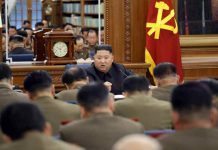Kwon Jong Gun, a roving ambassador for North Korean’s Foreign Ministry, said on Wednesday that North Korea’s patience for restarting US-North Korean talks is “nearing its limitations.” Claiming that the United States and South Korea will be resuming joint air drills in December, Kwon warned that North Korea will not overlook these “reckless military moves.”
Kwon also added that the “planned joint military exercise can […] compel us to reconsider the crucial measures” North Korea has already taken, invoking the possibility of more nuclear tests or the launch of additional intercontinental ballistic missiles (ICBMs).
These threats have not been the only ones made by North Korea recently. On Oct. 24, Kim Gye Gwan, an adviser to the country’s Foreign Ministry, said “we want to see how wisely the US will pass the end of the year.” If this statement was gently worded, it was only in relation to the far harsher statement from Kim Yong-chol, vice chairman of the Central Committee of the Workers’ Party of Korea.
On Oct. 27, Kim released a statement in his capacity as chairman of the Korea Asia-Pacific Peace Committee, saying, “The US is seriously mistaken if it is of the idea of passing off in peace [at] the end of this year.” While alternating between its hard and soft line approaches North Korea is simultaneously leaving open the possibility of a return to past provocations.
Relations between North Korea and the US do not seem to be progressing. Lee Soo-hyuck, South Korea’s ambassador to the US, told journalists on Oct. 31 that he did not believe that there was any communication between the U.S. and North Korea, and admitted that he did not believe it likely that negotiations between the two countries would restart in November.
SOUTH KOREA’S SPY AGENCY OPTIMISTIC ABOUT PROSPECTS FOR US-DPRK TALKS
Not everyone is so pessimistic about prospects for US-DPRK talks. On Monday, during the parliamentary audit at the South Korean National Assembly, the National Intelligence Service (NIS) predicted that “North Korean leader Kim Jong Un will aim to resume US-DPRK summit talks in December, and, at the earliest, hold negotiations in November.”
According to Lee Hye-hoon, the chairman of the National Assembly’s intelligence committee, “The NIS predicts that North Korea’s goal is to hold a US-DPRK summit this December.” Throwing some cold water on that prediction, the NIS then claimed that it had not made any reference to a specific timeline for the third US-North Korean summit. That being said, based on the agency’s briefings of the intelligence committee in the National Assembly, and its references to negotiations between the US and North Korea in November and early December, the NIS appears optimistic about the possibility of talks between the U.S. and North Korea by the end of this year.
How the NIS views prospects for US-North Korean talks is significant, particularly when compared to the opinions held by run-of-the-mill North Korea observers. The NIS is South Korea’s intelligence agency and presumably bases its predictions on facts, which makes them worthy of special consideration. The NIS has not specifically mentioned the facts that form the background to their prediction; nonetheless, it would be foolish to ignore their views.
OUTCOME OF US-DPRK TALKS UNCERTAIN AS TWO SIDES CONTINUE PUSH-AND-PULL
North Korea’s latest barrage of provocative statements are not as contradictory to the negotiations process between the US and the DPRK as they may seem. Intensifying tension through the creation of a crisis is a common way to bring two sides to the negotiation table. Embedded in North Korea’s constant references to its “limited patience” might actually be a plea to the US to re-enter negotiations before it’s “too late.”
At the same time, North Korea’s provocative statements may not lead to a positive outcome. While crises can lead to negotiations, it is uncertain at this moment whether that will be the case. We cannot rule out the possibility that North Korea may be building up a case to justify any future actions in another, more negative, direction should US-North Korean talks fail to bear any fruit.
*Translated by Violet Kim
Views expressed in Guest Columns do not necessarily reflect those of Daily NK.
Please read Ahn Jong Sik’s previous column on ways North Korea needs to improve its tourism industry here.





















